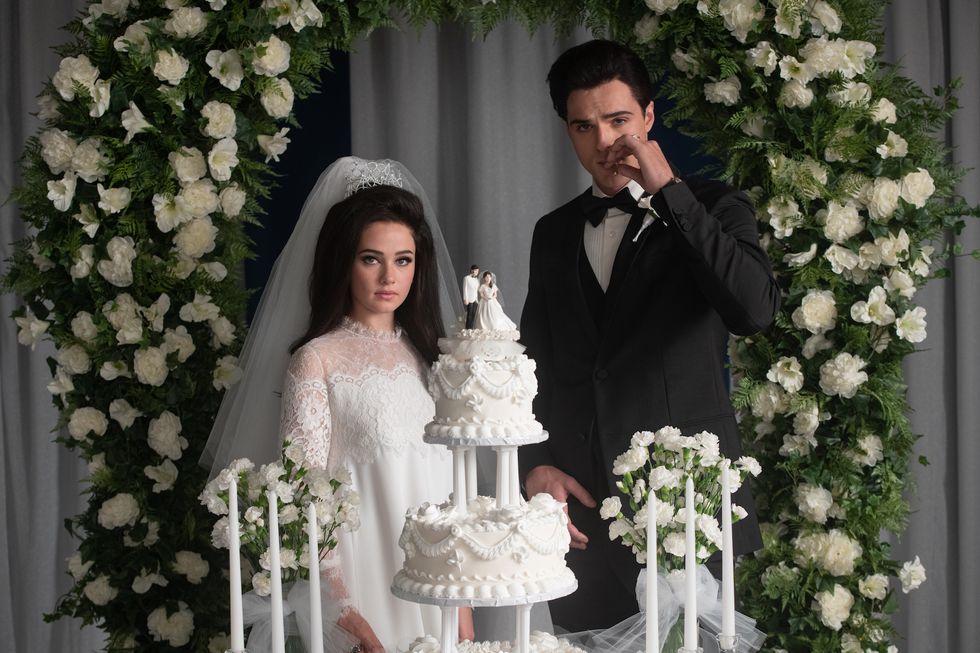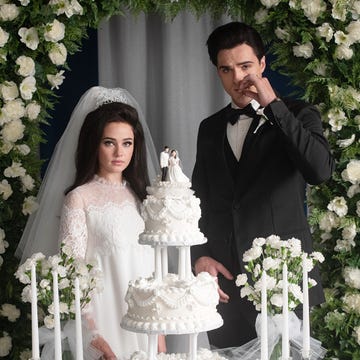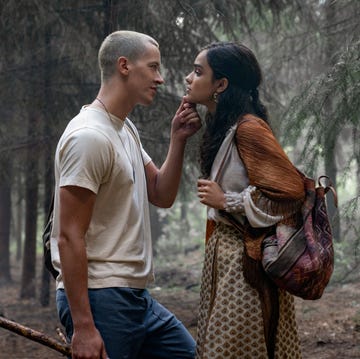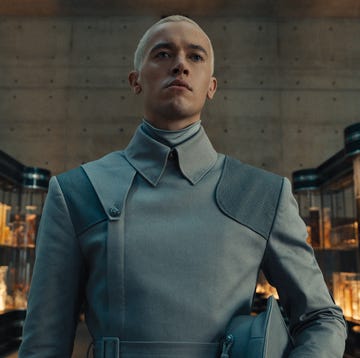Actors often dream of landing that big biopic role. Getting the chance to tell the life story of a celebrated or notorious figure can be a career pinnacle for even the most experienced performers.
Cailee Spaeny, the star of A24’s Priscilla, never expected her biopic moment to come when she was just 25, or that it would involve playing half of one of music’s most famous couples. But when Sofia Coppola calls, you pick up.
“To get that call was unbelievable,” Spaeny tells Harper’s Bazaar from London, ahead of the film’s U.K. premiere. (Spaeny, along with Coppola and her costars received an interim SAG-AFTRA agreement to be able to promote the independently produced film amid the Hollywood actors' strike). Kirsten Dunst—her costar in another A24 project, upcoming sci-fi action epic Civil War—had suggested her for the part. “It was just like all my childhood dreams coming true,” Spaeny says. “When [Coppola] called me initially, she just said, ‘Can you fly to New York and meet with me?’ And that’s all I needed. A hundred percent. My bags are packed, I’m ready to go.”
Spaeny didn’t know Coppola was working on adapting Priscilla Presley’s 1985 memoir Elvis and Me for the big screen when she sat down with the director over coffee and croissants. Coppola simply took out her iPad, started flicking through photos of Priscilla, and told Spaeny she believed she could play the role.
“I wish there was a sort of neck-and-neck, ‘really fought for it’ aspect to it all,” Spaeny says, laughing. “I mean, in some ways my career has been building up to eventually playing some sort of lead role. But never in my wildest dreams would it have been this role with this director in this way.”
One could argue that for years, society has viewed Elvis and Priscilla’s union through an indulgent, nostalgic lens, glamorizing the over-the-top wedding photos, the stylish jet-setting, the lone heir in Lisa Marie. All of those aspects are a part of Priscilla (and masterfully captured by the film's fashion and makeup teams), but Coppola has little interest in rehashing pop culture lore. For decades, fans and the media alike have glossed over the power imbalances in Elvis and Priscilla’s union. Priscilla Presley was never treated as her own person so much as she was a mascot for Elvis’s legacy. Priscilla, the film, gives her back her voice.
“I wanted to be respectful and open and nonjudgmental of some of the more shocking details [of their marriage] that I wasn’t aware of beforehand,” says Spaeny. “[Priscilla] has obviously been eclipsed her whole life by this man, and it was overdue to tell her side of the story, and to do it with care and attention to detail and room for nuance. I tried to take the time I spent with Priscilla herself, and the truth of what she had put in the book, and put that onscreen the best we could—and Sofia does it in this really beautiful, impressionistic way that almost feels like a memory.”
There were plenty of memories to sort through, since Spaeny had the challenge of portraying Priscilla from the age of 14 (when she first met Elvis, who was 24 at the time) to 28 (when she finally left their marriage). Navigating Priscilla’s growth was an essential component of the film; it’s her age, after all, that sparks the inner conflict of the movie, especially to audiences watching the relationship from the vantage of 2023.
“Her arc and her journey is the film—that’s the movie. The first challenge I took on was: How do I think about the emotional differences and the physical differences as she ages?” Spaeny says. “There’s not a lot of footage of her from that time. There’s none in terms of her speaking. But there’s amazing home videos, and obviously I drew from speaking to Priscilla herself, from the book, and also from looking at women from that time. Playing 14, I didn’t want it to feel forced and awkward. It was important for her to feel like a child because she was.”
The film’s costumes—including ’70s denim jumpsuits, A-line skirts, and flouncy lingerie—plus of course Priscilla’s signature bold makeup, helped Spaeny embrace the different eras of her life.
“The hair, the makeup, the costumes—that all informed how I would move and where I’d be in her journey. When I had my poodle skirt on, it would change the way I moved on set and how I was in the scene. Then I have the beehive hair, and I’m in high heels and little doll-like dresses, and that always made me feel restricted and stiff and almost regal,” the actor says. “She was always sort of on for him. Once she’s a mother, she’s wearing denim and she’s got her ’70s blowout and she’s taking the makeup off. Then I felt like I could be more myself. While filming, I was pregnant in the morning and I was 14 after lunch, so it was tricky to keep my head on straight, but I had Sofia and Jacob [Elordi, who plays Elvis] to lean on along the way. If I didn’t have that, I don’t think I could have done it.”
Elordi was the perfect partner for Spaeny when it came to understanding the delicate love story they were assigned to portray.
“Jacob had a lot of pressure on his shoulders, but he did such a beautiful job, and really shows the more complicated, nuanced sides of Elvis that we’ve chosen to ignore or never even knew about,” Spaeny says. “Both sides had to be portrayed: the toxic, tumultuous side of their relationship, but also the complicated love that they had for each other that was obviously very real. To be able to work with someone in that role, I knew that I had to trust this person and I had to be able to feel comfortable and that there had to be some sort of rapport and connection. [Jacob is] a close friend now. I feel really lucky that I had him.”
Sofia Coppola films are often conversation starters, and Priscilla will be no different. Underneath the director’s signature hazy visual style and the sublime soundtrack (which, intriguingly, features zero Presley songs), it’s a story about the blurred lines between girlhood and womanhood, and the complicated give-and-take between power and passion.
“Sofia’s films always have a cultural impact, while also exploring the mysterious interior of young women. They let you look inward and ask the bigger questions, like: How far are you going to go to sacrifice yourself for a person?” Spaeny says. “Her films changed me when I was a young girl. I hope that that will happen again for this generation.”
Bianca Betancourt is the culture editor at HarpersBAZAAR.com, where she covers all things film, TV, music, and more. When she's not writing, she loves impulsively baking a batch of cookies, re-listening to the same early-2000s pop playlist, and stalking Mariah Carey's Twitter feed.
















